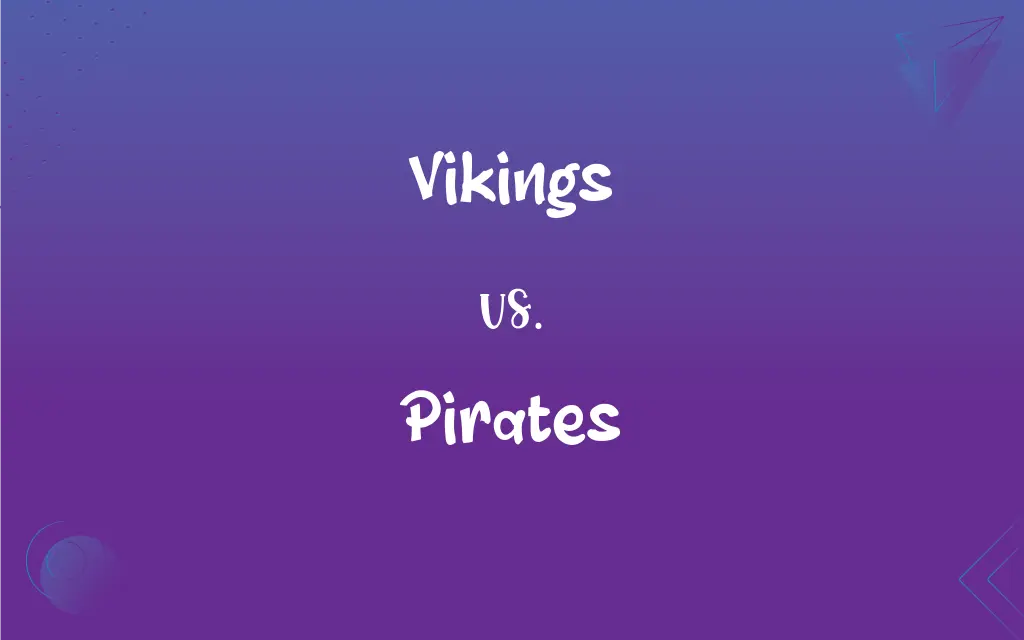Vikings vs. Pirates: What's the Difference?
Edited by Aimie Carlson || By Harlon Moss || Published on December 29, 2023
Vikings were Norse seafarers known for exploring and settling from the 8th to 11th century; pirates are sea robbers or raiders active across various eras.

Key Differences
Vikings, originating from Scandinavia, were explorers, traders, and warriors from the late 8th to early 11th centuries. Pirates, in contrast, have been present in various forms throughout history, known primarily for their acts of robbery and criminality at sea.
Vikings are famed for their raids across Europe, using their longships for quick and effective attacks. Pirates, however, operated in different regions and times, targeting ships for loot irrespective of national boundaries.
The Viking Age marks a distinct historical period, with Vikings also contributing to settlement and trade. Pirates, diverse in their timelines, are not tied to a specific era but are known throughout history, including the Golden Age of Piracy in the 17th and 18th centuries.
Vikings had a significant impact on European history, influencing culture, language, and geopolitics. Pirates, while influential in maritime history, are often viewed through the lens of criminality and their impacts on naval warfare and commerce.
Viking society was complex, with a rich mythology and social structure. Pirate society, varying widely, often operated outside societal norms, with some democratic elements among crews.
ADVERTISEMENT
Comparison Chart
Era
Late 8th to early 11th centuries
Various eras, including the Golden Age of Piracy
Primary Activities
Raiding, trading, exploring, settling
Sea robbery, raiding ships
Geographical Origin
Scandinavia
Worldwide, no specific origin
Impact on History
Significant cultural and political influence
Noted for influence on maritime history
Social Structure
Complex society with mythology and hierarchy
Diverse, often democratic among crews
ADVERTISEMENT
Vikings and Pirates Definitions
Vikings
Scandinavian seafarers known for raiding and colonizing.
Vikings established settlements in Greenland and Iceland.
Pirates
Individuals who engage in robbery at sea.
Pirates were feared for their attacks on merchant ships.
Vikings
Norsemen known for their distinct longships.
The Vikings’ longships were fast and versatile for their expeditions.
Pirates
Seaborne bandits known for their lawlessness.
The golden age of pirates is a popular subject in history.
Vikings
Medieval warriors from Northern Europe.
Vikings played a crucial role in European medieval history.
Pirates
Sea raiders who operate without legal authority.
Pirates in the Caribbean were a major threat during the 17th century.
Vikings
A term for seafaring people from Norway, Denmark, and Sweden.
The Vikings left a lasting legacy in the regions they explored.
Pirates
Marauders known for attacking ships and coastal areas.
Pirates frequently targeted the wealthy trade routes.
Vikings
Norse explorers, warriors, and traders in the 8th-11th century.
The Vikings sailed across the North Atlantic, discovering new lands.
Pirates
Outlaws at sea, often romanticized in popular culture.
Stories of pirates often involve treasure hunts and adventures.
Vikings
One of a seafaring Scandinavian people who raided the coasts of northern and western Europe from the eighth through the tenth century.
Pirates
One who commits or practices piracy at sea.
Vikings
A Scandinavian.
Pirates
One who makes use of or reproduces the work of another without authorization.
Vikings
Plural of viking
Pirates
One who illegally intercepts or uses radio or television signals, especially one who operates an illegal television or radio station.
Pirates
To attack and rob (a ship at sea).
Pirates
To take (something) by piracy.
Pirates
To make use of or reproduce (another's work) without authorization.
Pirates
To act as a pirate; practice piracy.
Pirates
Plural of pirate
FAQs
What defines a Viking?
Vikings were Norse seafarers known for exploration, raiding, and trading.
Were Vikings only raiders?
No, Vikings were also traders, explorers, and settlers.
When did the Vikings exist?
Vikings were active primarily from the 8th to the 11th century.
What is a pirate?
A pirate is someone who engages in maritime robbery or criminal activities at sea.
What era is known for pirates?
Pirates have been around for centuries, but the Golden Age of Piracy was in the 17th and 18th centuries.
What was the social structure among pirates?
Pirate crews often operated with a level of democracy and shared governance.
What ships did Vikings use?
Vikings used longships, known for their speed and agility.
Did Vikings contribute to settlement?
Yes, Vikings established settlements in areas like Greenland and Iceland.
What kind of ships did pirates use?
Pirates used various ships, often captured and modified for their needs.
Did pirates establish colonies?
Pirates generally did not establish colonies, focusing instead on raiding and looting.
Were Vikings part of a structured society?
Yes, Viking society had a complex structure with its own culture and hierarchy.
Did pirates have a specific origin?
Pirates came from various backgrounds and regions, with no specific origin.
What religions did Vikings follow?
Vikings followed Norse paganism before many converted to Christianity.
What motivated pirates?
Pirates were primarily motivated by profit and personal gain.
Did Vikings trade?
Yes, Vikings were engaged in extensive trade networks.
What impact did pirates have on maritime trade?
Pirates significantly affected maritime trade, often disrupting key trade routes.
What is the legacy of the Vikings?
Vikings left a significant legacy in European history, culture, and language.
Were pirates religiously motivated?
Pirates were generally not religiously motivated, focusing on wealth and personal gain.
How did Viking raids impact Europe?
Viking raids had a profound impact on European development, leading to changes in defense and politics.
How are pirates viewed historically?
Pirates are often seen as outlaws but have been romanticized in popular culture.
About Author
Written by
Harlon MossHarlon is a seasoned quality moderator and accomplished content writer for Difference Wiki. An alumnus of the prestigious University of California, he earned his degree in Computer Science. Leveraging his academic background, Harlon brings a meticulous and informed perspective to his work, ensuring content accuracy and excellence.
Edited by
Aimie CarlsonAimie Carlson, holding a master's degree in English literature, is a fervent English language enthusiast. She lends her writing talents to Difference Wiki, a prominent website that specializes in comparisons, offering readers insightful analyses that both captivate and inform.































































